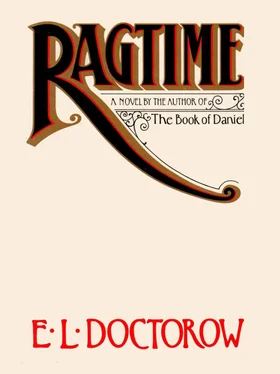Edgar Doctorow - Ragtime
Здесь есть возможность читать онлайн «Edgar Doctorow - Ragtime» весь текст электронной книги совершенно бесплатно (целиком полную версию без сокращений). В некоторых случаях можно слушать аудио, скачать через торрент в формате fb2 и присутствует краткое содержание. Жанр: Современная проза, на английском языке. Описание произведения, (предисловие) а так же отзывы посетителей доступны на портале библиотеки ЛибКат.
- Название:Ragtime
- Автор:
- Жанр:
- Год:неизвестен
- ISBN:нет данных
- Рейтинг книги:4 / 5. Голосов: 1
-
Избранное:Добавить в избранное
- Отзывы:
-
Ваша оценка:
- 80
- 1
- 2
- 3
- 4
- 5
Ragtime: краткое содержание, описание и аннотация
Предлагаем к чтению аннотацию, описание, краткое содержание или предисловие (зависит от того, что написал сам автор книги «Ragtime»). Если вы не нашли необходимую информацию о книге — напишите в комментариях, мы постараемся отыскать её.
Ragtime — читать онлайн бесплатно полную книгу (весь текст) целиком
Ниже представлен текст книги, разбитый по страницам. Система сохранения места последней прочитанной страницы, позволяет с удобством читать онлайн бесплатно книгу «Ragtime», без необходимости каждый раз заново искать на чём Вы остановились. Поставьте закладку, и сможете в любой момент перейти на страницу, на которой закончили чтение.
Интервал:
Закладка:
The family sat at the dinner table. Mother held the baby in her arms. Without realizing it she did not now expect ever to put the child down. She felt the touch of his tiny fingertips on her cheek. Upstairs in his room Grandfather groaned in pain. There was no dinner this evening, nobody wanted to eat. A cut-glass carafe of brandy was set in front of Father. He was drinking his third glass. He felt that something, some sort of small bone or piece of dust, was lodged in his throat and he had conceived of the brandy as the only thing that would fix it. He had taken from his bureau drawer his old army pistol from the Philippine campaign. It lay on the table. We are suffering a tragedy that should not have been ours, he said to his wife. What in God’s name possessed you on that day? The county has facilities for indigents. You took her in without sufficient thought. You victimized us all with your foolish female sentimentality. Mother regarded him. She could not remember any time in their long acquaintance when he had reproached her. She knew he would apologize; nevertheless tears filled her eyes and eventually ran down her face. Wisps of her hair had come undone and lay on her neck and over her ears. Father looked at her and she was beautiful in the way she had been as a girl. He did not realize the pleasure he felt in having made her cry.
Young Brother was sitting with his elbow on the arm of his chair and his head propped in his hand. His index finger was extended and pointed at his temple. He watched his brother-in-law. Are you going out to find him and shoot him? he said. I’m going to protect my home, Father said. This is his child here. If he makes the mistake of coming to my door I will deal with him. But why should he come here, Brother said in a goading tone of voice. We did not desecrate his car. Father looked at Mother. In the morning I will go to the police and have to tell them this murdering madman was a guest in my home. I will have to tell them we are keeping his bastard child. Younger Brother said I think Coalhouse Walker Jr. would want you to tell the police everything you know. You can tell them he’s the same Negro maniac whose car is lying at the bottom of Firehouse Pond. You can tell them he’s the fellow who visited their own headquarters to make a complaint against Will Conklin and his thugs. You can tell then he’s the same crazed black killer who sat by the bedside of someone who died in the hospital of her injuries. Father said I hope I misunderstand you. Would you defend this savage? Does he have anyone but himself to blame for Sarah’s death? Anything but his damnable nigger pride? Nothing under heaven can excuse the killing of men and the destruction of property in this manner! Brother stood so abruptly that his chair fell over. The baby started and began to cry. Brother was pale and trembling. I did not hear such a eulogy at Sarah’s funeral, he said. I did not hear you say then that death and the destruction of property was inexcusable.
But the fact was that Coalhouse Walker has already taken several steps to identify himself with the crime. It turned out that within an hour of the explosion he, or some other black man, left identical letters at the offices of the two local newspapers. The editors after conferring with the police chose not to print them. The letters were written in a clear firm hand and told of the events leading up to the attack on the firehouse. I want the infamous Fire Chief of the Volunteers turned over to my justice, the letter said. I want my automobile returned to me in its original condition. If these conditions are not met I will continue to kill firemen and burn firehouses until they are. I will destroy the entire city if need be. The newspaper editors and police officials believed it was in the interest of the public welfare not to print the letter. An isolated crazed killer was one problem. An insurrection was another. Squads of police quietly went through the Negro neighborhoods and asked questions about Coalhouse Walker Jr. At the same time police of neighboring towns with Negro populations did the same. To headquarters the word filtered back: Not one of our Negroes. Not one of ours.
In the morning Father took the North Avenue streetcar downtown. He strode to City Hall. He went in the door a widely respected businessman in the community. His career as an explorer had been well reported in the newspapers. The flag that flew from the cupola on top of the building had been his gift to the city.
III
29
Father had been born and raised in White Plains, New York. He was an only child. He remembered moments of light and warmth in the days of summer at Saratoga Springs. There were gardens there with paths of washed gravel. He would stroll with his mama down the large painted porches of the great hotels. On the same day every year they went home. She was a frail woman who dies when he was fourteen. Father attended Groton and then Harvard. He read German Philosophy. In the winter of his sophomore year his studies ended. His father had made a fortune in the Civil War and had since used his time losing it in unwise speculations. It was now entirely gone. The old man was the sort that thrived on adversity. His confidence rose with every loss. In bankruptcy he was beaming and triumphant. He died suddenly, all his expectations intact. His flamboyance had produced in his lonely son a personality that was cautious, sober, industrious and chronically unhappy. Coming into his majority, the orphan took the few dollars left to him and invested it in a small fireworks business owned by an Italian. Eventually he took it over, expanded its sales, bought out a flag manufacturing firm and became quite comfortable. He had also found time to secure an army commission in the Philippine campaigns. He was proud of his life but never forgot that before going into business he had been to Harvard. He had heard William James lecture on the principles of Modern Psychology. Exploration became his passion: he wanted to avoid what the great Dr. James had called the habit of inferiority to the full self.
Now every morning Father rose and tasted his mortal being. He wondered if his dislike for Coalhouse Walker, which had been instantaneous, was based not on the man’s color but on his being engaged in an act of courtship, a suspenseful enterprise that suggested the best of life was yet to come. Father noted the skin mottling on the back of his hand. He found himself occasionally asking people to repeat to him what they’d said. His bladder seemed always to demand emptying. Mother’s body did not arouse his lust, only his quiet appreciation. He admired her shape and softness but was no longer inflamed. He noted that she had grown heavier in the upper arms. Once accustomed to life together after his return from the Artic, they had slipped into an undemanding companionship in which he felt by-passed by life, like a spectator at an event. He found distasteful her promotion of the black girl’s marriage. And now that Sarah was dead he felt altogether invisible, Mother’s grief having directed her attention solely on Sarah’s boy.
He recognized that he took satisfaction in going to the police. It was not an entirely righteous feeling. Perhaps in compensation, he represented Coalhouse as a peaceful man driven mad by circumstances not of his own doing. This was exactly the argument Younger Brother made at home. Father confirmed the account of events in Coalhouse’s letter. He was a pianist, Father said, using the historical tense. He was always courteous and correct in his dealings. The police nodded gravely. They wanted to know if the Negro was likely to strike again. That is what the Police Chief said, strike again. Father said that once Coalhouse had set a course for himself he was nothing if not persevering. Largely upon this advice a defense was organized. Police guards were assigned to all the firehouses in the city. The main roads were placed under watch. In the headquarters a wall map was installed showing the deployment of forces. On the basis of Father’s information the New York City Police Department was persuaded to assign detectives to look for Coalhouse in Harlem.
Читать дальшеИнтервал:
Закладка:
Похожие книги на «Ragtime»
Представляем Вашему вниманию похожие книги на «Ragtime» списком для выбора. Мы отобрали схожую по названию и смыслу литературу в надежде предоставить читателям больше вариантов отыскать новые, интересные, ещё непрочитанные произведения.
Обсуждение, отзывы о книге «Ragtime» и просто собственные мнения читателей. Оставьте ваши комментарии, напишите, что Вы думаете о произведении, его смысле или главных героях. Укажите что конкретно понравилось, а что нет, и почему Вы так считаете.












